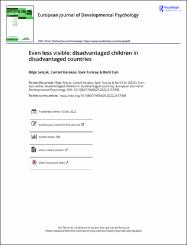Please use this identifier to cite or link to this item:
https://hdl.handle.net/20.500.11779/1895Full metadata record
| DC Field | Value | Language |
|---|---|---|
| dc.contributor.author | Tuncay, Ipek | - |
| dc.contributor.author | Selçuk, Bilge | - |
| dc.contributor.author | Can, Beril | - |
| dc.contributor.author | Karakas, Cansel | - |
| dc.date.accessioned | 2023-03-06T06:53:13Z | |
| dc.date.available | 2023-03-06T06:53:13Z | |
| dc.date.issued | 2022 | - |
| dc.identifier.citation | Selçuk, B., Karakas, C., TuncayI., & Can, B. (2022). Even less visible: disadvantaged children in disadvantaged countries. European Journal of Developmental Psychology, 1–16. https://doi.org/10.1080/17405629.2022.2157398?? | en_US |
| dc.identifier.issn | 17405629 | - |
| dc.identifier.uri | https://doi.org/10.1080/17405629.2022.2157398 | - |
| dc.identifier.uri | https://hdl.handle.net/20.500.11779/1895 | - |
| dc.description.abstract | In this paper, we have a quick look at the profile of developmental research in terms of its study samples, and then turn our attention to the findings of research on the COVID-19 pandemic and climate change, suggesting a notable increase in the number of people experiencing significant economic difficulties and a widening gap between the wealthy and the poor. While this is obviously a cause of concern for scientists, practitioners and policymakers, we suggest that the digital revolution which accelerated even more with the COVID-19 pandemic may open new ways to support healthy development and psychological wellbeing in socio-economically or developmentally disadvantaged populations. Moreover, acceleration of the digital transformation may also allow us to study the human mind and behaviour in countries economically categorized as 'under-developed' or 'developing', and under-represented in psychological science. Taking the recent advancements as a base, we contemplate the possibility that major technological changes facilitated by the recent COVID-19 pandemic might allow us to meet the scientific and applied goals of psychology more successfully. | en_US |
| dc.language.iso | en | en_US |
| dc.publisher | Routledge | en_US |
| dc.rights | info:eu-repo/semantics/openAccess | en_US |
| dc.subject | Disadvantaged children | en_US |
| dc.subject | Child development | en_US |
| dc.subject | Psychological wellbeing | en_US |
| dc.subject | Developing countries | en_US |
| dc.subject | Digitalization | en_US |
| dc.title | Even Less Visible: Disadvantaged Children in Disadvantaged Countries | en_US |
| dc.type | Article | en_US |
| dc.identifier.doi | 10.1080/17405629.2022.2157398 | - |
| dc.identifier.scopus | 2-s2.0-85144280657 | en_US |
| dc.authorid | Selçuk, Bilge / 0000-0001-9992-5174 | - |
| dc.description.PublishedMonth | Aralik | en_US |
| dc.description.woscitationindex | Social Science Citation Index | - |
| dc.description.WoSDocumentType | Article | |
| dc.description.WoSInternationalCollaboration | Uluslararasi isbirligi ile yapilmayan - HAYIR | en_US |
| dc.description.WoSIndexDate | 2023 | en_US |
| dc.description.WoSYOKperiod | YÖK - 2022-23 | en_US |
| dc.relation.publicationcategory | Makale - Ulusal Hakemli Dergi - Kurum Öğretim Elemanı | en_US |
| dc.department | IISBF, Psikoloji Bölümü | en_US |
| dc.relation.journal | European Journal of Developmental Psychology | en_US |
| dc.identifier.wos | WOS:000899235900001 | en_US |
| dc.institutionauthor | Selçuk, Bilge | - |
| item.grantfulltext | open | - |
| item.fulltext | With Fulltext | - |
| item.languageiso639-1 | en | - |
| item.openairetype | Article | - |
| item.openairecristype | http://purl.org/coar/resource_type/c_18cf | - |
| item.cerifentitytype | Publications | - |
| crisitem.author.dept | 04.02. Department of Psychology | - |
| Appears in Collections: | Psikoloji Bölümü Koleksiyonu Scopus İndeksli Yayınlar Koleksiyonu / Scopus Indexed Publications Collection WoS İndeksli Yayınlar Koleksiyonu / WoS Indexed Publications Collection | |
Files in This Item:
| File | Description | Size | Format | |
|---|---|---|---|---|
| Even less visible disadvantaged children in disadvantaged countries.pdf | Full Text - Article | 604.2 kB | Adobe PDF |  View/Open |
CORE Recommender
Page view(s)
24
checked on Nov 18, 2024
Download(s)
10
checked on Nov 18, 2024
Google ScholarTM
Check
Altmetric
Items in GCRIS Repository are protected by copyright, with all rights reserved, unless otherwise indicated.